October 19, 2012
Air Date: October 19, 2012
FULL SHOW
SEGMENTS
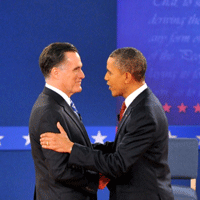
Debate #2 and Energy
View the page for this story
In the closing weeks of the election campaign, energy continues as a sharp point of difference between President Obama and Governor Romney. Host Steve Curwood examines the clash over energy in the recent presidential town-hall debate. (04:00)
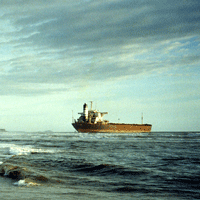
Exporting US Oil
View the page for this story
The search for energy independence has been a central issue for the presidential candidates. But six major oil companies recently applied for permits to begin exporting U.S. crude. Economist Joe Stanislaw discusses the implications of this and the United State’s role in the global energy economy with host Steve Curwood. (08:00)
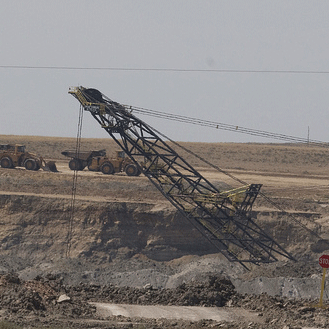
Wyoming Coal
/ Ashley AhearnView the page for this story
Some 5 deep water ports in the Pacific Northwest are under consideration as terminals to export coal from Wyoming and Montana . Ashley Ahearn from Earth Fix reports that they would principally be used to bring coal from Wyoming to markets in Asia. (05:15)
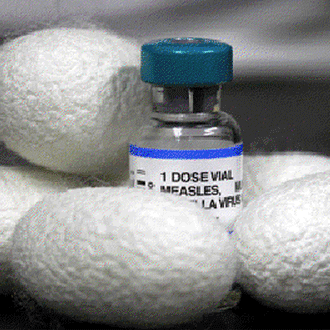
Science Note: Silk Saves Lives
/ Annie SneedView the page for this story
Silk isn’t just for high fashion. Scientists have discovered a way to safely send pharmaceutical drugs across the globe by dressing them in silk. Annie Sneed reports. (01:50)
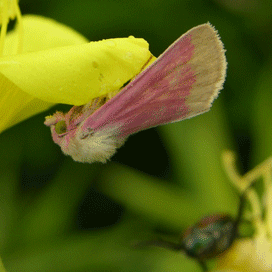
How Insects Influence Plant Evolution
View the page for this story
From the spiciness of the chili pepper to horseradish’s bitter bite, many plant traits are evolutionary adaptations to insect attacks. Cornell biologist Anurag Agrawal explains to host Steve Curwood just how speedily plants can evolve and adapt when insect populations change. (07:15)
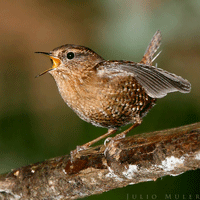
BirdNote: Pacific Wren
/ Mary McCannView the page for this story
To human ears birds' songs sound quick and repetitive but BirdNote’s Mary McCann reports that to another bird the same song might sound like a complex operatic aria. (02:05)

Disney’s Commitment to the Circle of Life
View the page for this story
Two years ago nine of the top ten American publishers of children’s books — including Disney — used paper from endangered rainforests. Most of the publishers have now committed to sustainable paper and Disney has just announced it will also stop buying paper linked to rainforest destruction. Robin Averbeck, Forest Campaigner for the Rainforest Action Network, tells host Steve Curwood how the organization helped Disney to develop its new paper policy. (08:00)
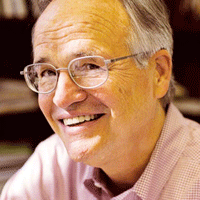
America the Possible
View the page for this story
Presidential advisor and Vermont Law professor James Gustave Speth has a new book out titled, America the Possible: Manifesto for a New Economy. Speth talks with host Steve Curwood about ways to reinvent the American economy as one that values nature and quality of life over GDP. (10:20)
Show Credits and Funders
Show Transcript
HOST: Steve Curwood
GUESTS: Joe Stanislaw, Anurag Agrawal, Robin Averbeck, Gus Speth
REPORTERS: Ashley Ahearn, Annie Sneed, Mary McCann
[THEME]
CURWOOD: From Public Radio International - this is Living on Earth. I'm Steve Curwood. Energy independence is a hot topic on the Presidential campaign trail but experts say we're nearly there already - whoever wins the White House.
STANISLAW: The potential for North America to be self-sufficient in energy - in oil and gas in the United States potentially in 10-15 years, this is like an earthquake in the mindset of the global energy community and the US energy community.
CURWOOD: Oil companies already want to export US crude. Also, some Wyoming town folk say mining coal has saved their economy.
LUBNAU: Gillette depends hugely on the coal industry. They’re a great corporate citizen. They contribute well to our communities. The coal industry statewide has built a billion dollars worth of schools.
CURWOOD: But some ranchers say coal is ruining their water - we'll have that and more this week, on Living on Earth. Stick Around!
[THEME]
ANNOUNCER: Support for Living on Earth comes from Stonyfield Farm.
Debate #2 and Energy
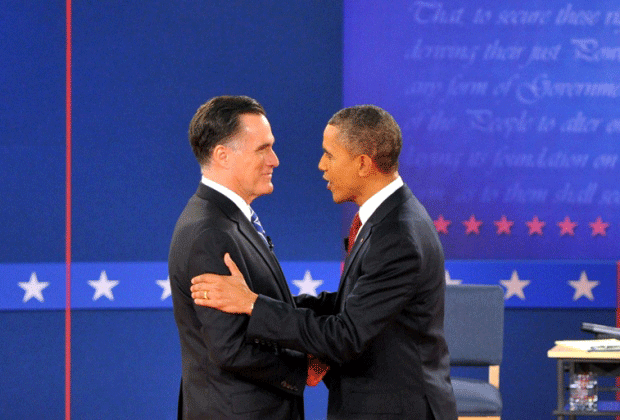
President Barack Obama shakes hands with Governor Mitt Romney. (Wanglei, Xinhua, Zuma Press/MCT)
CURWOOD: From the Jennifer and Ted Stanley Studios in Boston, this is living on Earth. I'm Steve Curwood. In these closing weeks of the presidential campaign energy continues to be a flashpoint in the debates between President Barack Obama and former Governor Mitt Romney. One testy exchanged at the Hofstra University town hall debate October 16th was set off by a question on gas prices to the President.
QUESTION FROM AUDIENCE: Your energy secretary, Steven Chu, has now been on record three times stating it's not policy of his department to help lower gas prices. Do you agree with Secretary Chu that this is not the job of the Energy Department?
OBAMA: The most important thing we can do is to make sure we control our own energy. So here's what I've done since I've been president: we have increased oil production to the highest levels in 16 years. Natural gas production is the highest it's been in decades. We have seen increases in coal production and coal employment.
But what I've also said is we can't just produce traditional sources of energy; we've also got to look to the future. That's why we doubled fuel efficiency standards on cars. That means that in the middle of the next decade, any car you buy, you're going to end up going twice as far on a gallon of gas. That's why we've doubled clean energy production like wind and solar and biofuels. And all these things have contributed to us lowering our oil imports to the lowest levels in 16 years.
CURWOOD: But Governor Romney wasn’t buying the president’s pitch, and charged the Obama Administration has reduced oil and gas production on federal lands, and cut the number of drilling permits.
ROMNEY: I want to make sure we use our oil, our coal, our gas, our nuclear, our renewables. I believe very much in our renewable capabilities — ethanol, wind, solar will be an important part of our energy mix. But what we don't need is to have the president keeping us from taking advantage of oil, coal, and gas. This has not been Mr. Oil, or Mr. Gas, or Mr. Coal.
Talk to the people that are working in those industries. I was in coal country. People grabbed my arms and said, ‘Please, save my job.’ The head of the EPA said, you can't build a coal plant. You'll virtually — it's virtually impossible, given our regulations. When the president ran for office, he said, if you build a coal plant, you can go ahead, but you'll go bankrupt.
That's not the right course for America. Let's take advantage of the energy resources we have, as well as the energy sources for the future. And if we do that, if we do what I am planning on doing, which is getting us energy independent, North American energy independence within eight years you're going to see manufacturing come back; jobs because our energy is low-cost.
OBAMA: Very little of what Governor Romney just said is true. We've opened up public lands. We're actually drilling more on public lands than in the previous administration. And my — the previous president was an oilman.
And natural gas isn't just appearing magically; we're encouraging it and working with the industry. And when I hear Governor Romney say he's a big coal guy — and keep in mind when — Governor, when you were governor of Massachusetts, you stood in front of a coal plant and pointed at it and said, this plant kills, and took great pride in shutting it down. And now suddenly you're a big champion of coal.
CURWOOD: Governor Romney stuck to his guns.
ROMNEY: Production on government land of oil is down 14 percent.
OBAMA: Governor —
ROMNEY: And production of gas is down 9 percent.
OBAMA: What you're saying is just not true. It's just not true.
ROMNEY: I — it's absolutely true. Look, there's no question but that the people recognize that we have not produced more oil.
OBAMA: I'll give you your time. Go ahead.
ROMNEY: — and gas on federal lands and in federal waters. And coal — coal production is not up, coal jobs are not up. I was just at a coal facility where some 1,200 people lost their jobs. The right course for America is to have a true all-of-the-above policy. I don't think anyone really believes that you're a person who's going to be pushing for oil and gas and coal.
Related links:
- Commission on Presidential Debates with lists of times, sponsors, topics and moderators
- NPR’s full transcript and audio of the October 16th Debate between President Obama and Governor Romney
Exporting US Oil
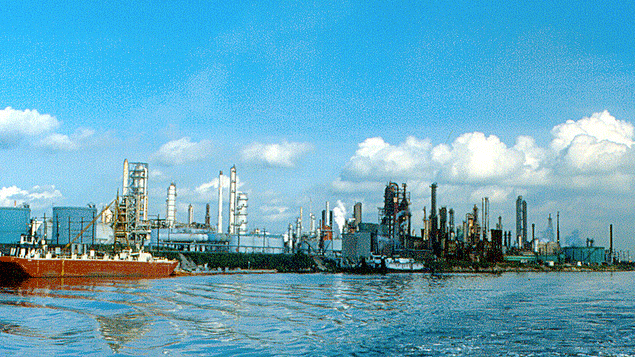
An oil refinery in Houston (Photo: Roger Wollstadt)
CURWOOD: Well, the Presidential candidates may debate US energy independence, but there may be less of an energy shortfall than the heated rhetoric would suggest.
The evidence for that? A group of six major oil companies – including BP and Shell – has just applied for permits to begin exporting U.S. crude oil abroad, starting with sending some of North Dakota’s light sweet crude to Canada, where refiners will pay a higher price.
If permits are granted, this would mark the first time in decades that oil companies were selling significant amounts of U.S. crude internationally. For some inside intelligence on the state of the American energy economy, we turn to Joe Stanislaw, economist and independent senior advisor to Deloitte. Joe Stanislaw, welcome to Living on Earth.
STANISLAW: Thank you for having me Steve.
CURWOOD: Oil companies are selling US oil abroad? What do you make of this news?
STANISLAW: It’s quite exciting news in many ways and challenging news. There’s a different mindset in the world of energy today than there was five years ago or 10 years ago. The United States is producing more and more oil and more and more natural gas. We’re going from a mindset of scarcity, to not surplus, but to real supply potential in the United States. That’s a different mindset.
CURWOOD: Is it a momentary bump in the oil supply or do you think this is a real trend now?
STANISLAW: I would call this a tectonic shift. The potential for North America to really be self-sufficient in energy and oil and gas, and the United States, potentially, in 10 or 15 years. This is really a major shift.
CURWOOD: The whole world of energy just changed then, is what you’re telling me.
STANISLAW: It has. Simply put it has. This is like an earthquake in the mindset of the global energy community and the US energy community.
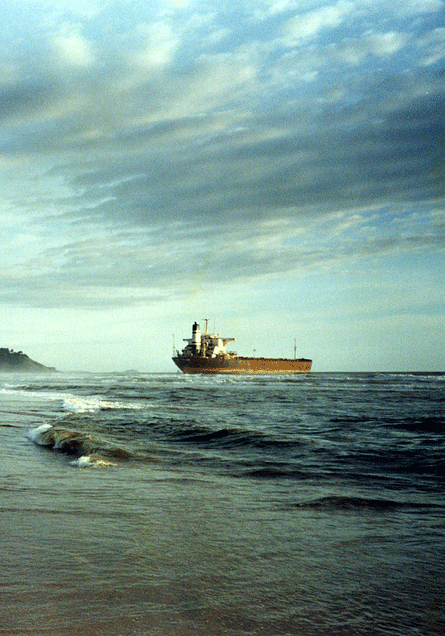
(Photo: Iqbal Mohammed)
CURWOOD: What’s causing this tectonic shift? Why do we suddenly have so much oil compared to what we’ve had in the past?
STANISLAW: You know, we’ve known about this oil shale, this shale of natural gas for seven decades or longer, we’ve know it’s down there. We had no way of getting it out. Technology has changed and technology advances. We have something called horizontal drilling. That’s where you put a well straight down and you say – I want to go left or I want to go right 90 degrees ¬– and you can make that shaft go left 90 degrees or right 90 degrees for five miles. Then you tie that to something else called fracking that can go into that shaft – now, fracking is controversial to many people – but you combine fracking with horizontal drilling and you’ve just changed the game.
Why has this happened? I’m going to use a terrible term, but I mean it in a very positive light; because of what I call crazy technology entrepreneurs. These are the people who owned that acreage with those mineral rights and said: ‘I have an asset and I have no way of getting it out.’ So these people worked on this to produce this technology, and it was small - they were the smaller companies, and some of the small oil folks who did this and the big guys bought into it and they’re now doing it globally because the potential is huge.
These crazy technology entrepreneurs exist all over the energy space. On the solar side, the heat pump side, the geothermal side, the efficiency side, etc. That’s part of this tectonic shift.
CURWOOD: Now, where is this oil going? Is this oil just going to Canada, or the world?
STANISLAW: We have actually been exporting crude oil to Canada before. Very small quantities. Usually less than 100,000 barrels per day, and there are conditions for that. You have to show economic and technical reasons why you can’t use it yourself, so you can export it, you have to be able to stop that export at a moment’s notice. The real issue is as we go down the road… two years, five years, ten years, will that expand from Canada to other countries?
CURWOOD: And where might it go then?
STANISLAW: It can go to a variety of different markets. It can go to different parts of South America, it could go to Europe, definitely it could go to China. You actually have people discussing port facilities on the West Coast primarily in Canada, to ship Canadian crude, which they can export obviously, toward Asia, which means primarily China or Japan.
They’re testing the waters now because these companies have what they call stranded oil, stranded because they can’t get the real value for the oil they actually have. You have all this oil sitting in the United States and it can’t go to the proper market. So the companies who produce it want to get more value, thus export becomes a route. So the little toe in the water, which is Canada, by all these companies, may become a foot in the water and then more going forward.
CURWOOD: So, both major Presidential candidates, President Barack Obama, Governor Romney are talking a lot about energy independence, what do you think about this idea of energy independence?
STANISLAW: Well, this mind change, this is a hard adjustment. I thought that I would never say that we would become independent or self-sufficient. But I’ve been saying it for five years - we have the potential to do that. Can we realize it? that’s a different question.
But we actually have the potential to do that. That’s significant. This means economic development and growth. Think about oil and gas. Think about gas – natural gas. You know, this is a major fuel for manufacturing industries. And it also helps us make the adjustments down the road to adjust to a different world, which may be a less-carbon world, and this can help that process by having more robust growth in the United States.
CURWOOD: Joe, can you clarify something for me? What’s the difference in your mind between energy independence and energy self-sufficiency?
STANISLAW: I’m very pleased that you brought this up, actually. You hear energy independence, and people think: ‘Oh, we have our own oil and gas, therefore gasoline can be a dollar fifty a gallon because we’re independent and we can charge what we want. Also, because we have all of the energy we need, we don’t have to worry about the Middle East, the security of oil flows around the world…’ Sufficiency doesn’t say that.
Self-sufficiency says that we have our own, we’re secure. But the reality of the market is, because we have all of the oil that we need, in ten or fifteen year’s time, we don’t control the price of oil… the market controls the price of oil. It’s a global price. So we could have all we want here, if there’s a major blow-up in the Middle East, the prices are going to go up.
CURWOOD: How soon do you think we’ll be able to produce that much oil to be self-sufficient here?
STANISLAW: We are right now producing, depending upon the day, between six and a half to seven million barrels per day. Call it seven. North America can meet all that demand, I think, if we really do everything right, and everything clicks correctly, which probably won’t happen, by 2020. The United States could probably do it by 2025 or 2030. If we do everything right. Now, when I say that, I mean, do things properly environmentally, for the community, to get the oil out of the ground safely.
But, equally, when I say that, I mean that we have to work on the demand side of the equation as well. The car fuel efficiency, making those homes more insulated, it’s also looking at the car fleet, some more cars that we’ll be using… more electric vehicles. Some will become natural gas vehicles. If we push in all those dimensions, plus a supply curve we could be.
CURWOOD: Now, to do this, Joe, do we need to use all this oil that’s in the tar sands of Canada that is so concerning to folks who look at the ecological effects of going after those tar sands?
STANISLAW: If I can do one thing – rather than call it tar sands, if I can – call it oil sands. Slight nuance there, but it’s an important one. It’s an important potential ingredient for the North American supply chain, there’s no question. I think one has to look at the oil sands and compare them to other crude oils, and also look at the oil sands and see what they’ve done in the past decade or two in their own environmental footprint, which has been significant.
They’re not perfect, they’re not 100 percent clean, but the strides they have made in reducing the amount of energy they use to produce the oil is significant, they’ve cut it by over half. Water usage is down by over a half. The scar that people worry about – the footprint – the visible footprint – they now have continuous land reclamation. You dig from one side and you replace from the other side. This is phenomenal stuff.
A lot more work needs to be done, and these companies are working on it, but when you talk about North America being energy self sufficient by the end of this decade, the oil sands plays into that. Does it mean we stay on oil permanently? I don’t think it does. I think it helps us make the path wider to get to where we want to get on the carbon side eventually. And I think we have to have a way there if we want to get robust growth and think about growth differently. It’s not the old growth we had, it’s the new growth we want to get to.
CURWOOD: Joe Stanislaw is an economist and an independent senior advisor to Deloitte. Thank you so much for coming in Joe!
STANISLAW: Steve, thank you for having me, I've enjoyed it!
Related links:
- More abut economist Joe Stanislaw
- Christian Science Monitor article on the question of exporting gasoline
[MUSIC: Andrew Bird “Hole In the Ocean Floor” from Break It yourself (Mom & Pop Records 2012).]
CURWOOD: Just ahead – international demand for coal is bringing boom times to some Wyoming towns - but some say it’s a losing proposition for the land and people. Stay tuned to Living on Earth!
[CUTAWAY MUSIC: Manu Katche: Running After Years” from Manu Katche (ECM Records 2012).]
Wyoming Coal
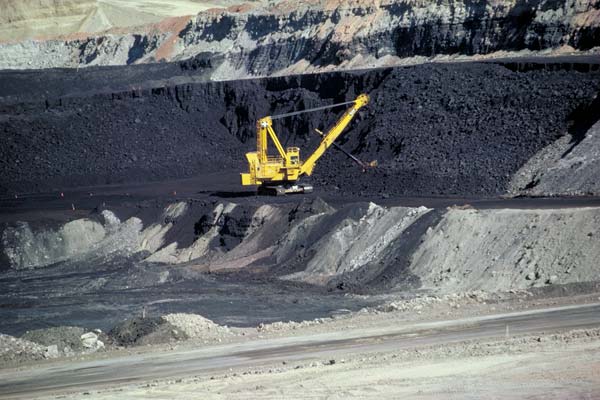
CURWOOD: It’s Living on Earth, I'm Steve Curwood. As many as five deep water ports in Washington and Oregon are considering building terminals to export American coal to Asia. The coal would come from mines in Wyoming and Montana and would travel by train through the Northwest.
That has governmental agencies, environmental groups, Native Americans, labor and industry in an increasingly fierce debate. Ashley Ahearn of the public radio collaborative EarthFix has our story from Wyoming coal country.
AHEARN: The U.S. produces about a billion tons of coal every year. Almost half of it is mined here in the Powder River Basin – in the Northeastern corner of the state of Wyoming.
[CAR SOUNDS]
WILLIAMS: This is Keith Williams. We’re touring the Black Thunder Coal mine in Gillette, WY.
AHEARN: This is one of the largest open pit mines in the world, and Keith Williams runs it.
WILLIAMS: Down we go.
AHEARN: Williams steers the truck along a dirt road - 300 feet down into the mine. The first thing that hits you is the sheer size of this operation. Dump trucks as big as California bungalows rumble around us. Back and forth they go - clearing away millions of pounds of clay and dirt to get at the rich coal seam underneath. It’s like peering into an ant colony under siege.
[DOORS OPENING, SHUTTING, LOUD MACHINE NOISE FADES UP]
AHEARN: And then we arrive at the core of the mine.
WILLIAMS: It’s the big one, it’s the queen bee. It’s the big machine.
AHEARN: We get out of the truck and stand in front of what’s called a dragline. It looks like a crane attached to an apartment building, swiveling back and forth, with a giant bucket suspended from one end to scoop earth. All of this to get to the black gold buried beneath. Some of this coal could end up being shipped out of terminals on the Washington coast.
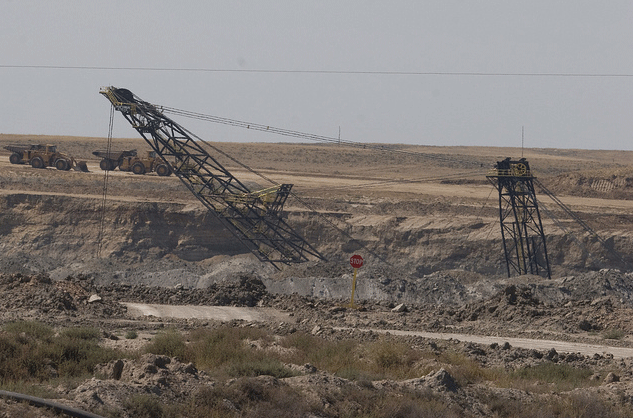
An open pit coal mine in the Powder Ridge Basin of Wyoming. (Photo: Kimon Berlin)
Within a 60-mile radius from where we’re standing there are 12 other strip mines like this one. They encircle the city of Gillette like a string of black pearls - or gaping holes in the earth. But where some see gaping holes, others see jobs.
LUBNAU: Gillette depends hugely on the coal industry.
AHEARN: Tom Lubnau is a state representative. He came to Gillette when he was 6 months old and has seen the city boom as coal companies pumped money into the local economy.
LUBNAU: They’re a great corporate citizen. They contribute well to our communities. In terms of a lot of things. The coal industry statewide has built a billion dollars worth of schools.
AHEARN: The coal industry employs 5,000 people in the mines of Campbell County – the center of mining operations in the Powder River Coal deposit. The average income here is 60,000 dollars a year.
LUBNAU: Gillette has become a marvelous place to live. Very low crime rate. Marvelous facilities, swimming pools, recreation centers, running tracks, parks.
AHEARN: Overwhelmingly, people here are proud of the coal industry. It is one of the key economic forces that transformed Gillette from a cow town along the rail line into a mini-metropolis amidst these dry rolling grasslands.
[FOOTSETPS ON GRAVEL PATH, FAINT COW SOUNDS IN THE BACKGROUND]
AHEARN: The sun’s setting as LJ Turner takes me out for a walk along the creek near his red-roofed ranch house.
TURNER: I’ve been here all my life and my family’s been here since 1918.
AHEARN: Turner and his wife Karen run Red Angus cows and sheep on this 10,000 acre ranch about 10 miles from the Black Thunder mine.
TURNER: When I was small we got our ice out of the creek for the household use. My job was to tamp sawdust around the blocks of ice then and we’d have enough ice that it would keep our household needs for the year.
AHEARN: Now the creek is a muddy trickle. Turner believes mining has destroyed the underground aquifers that feed this creek and others on his property. He’s extended his well down 1000 feet beneath his house and it’s still running dry.
Turner’s also upset that some of the nearby grazing land he used to lease from the Forest Service has now been leased to the coal companies to be mined. But alongside the local impacts, Turner worries about what burning more fossil fuels will do to the global climate. He says the impacts here are already clear.
TURNER: The first winter that Dad was here in 1919, he said it never got above 20 below for 6 weeks. But this last winter it froze up, but it didn’t freeze hard. We had green grass in February and it’s changing, it really is.
AHEARN: Turner looks out at a mule deer grazing nearby and pauses for a minute.
TURNER: I’m scared of it. I’m just scared of it.
[COW SOUNDS]
AHEARN: The forces that dictate how much coal is mined and where it ends up being burned are far away from these dry grasslands. US coal consumption is at a 40 year low, largely because of a boom in cheap natural gas. But international demand for coal is expected to rise 65 percent in the next 20 years or so. The majority of that increase will be in Asia.
That has Powder River Basin coal companies looking for ways to get their product across the Pacific as quickly and cheaply as possible. And they’re eyeing the Pacific Northwest as the fastest route. I’m Ashley Ahearn in Gillette, Wyoming.
[MUSIC: Hugh Masakela “Stimela (Coal Train) “ from Grazing In The Grass – The Best Of Hugh Masakela (Sony Music 1996).]
CURWOOD: Ashley's story comes to us from public radio's EarthFix. You can find more about Wyoming coal by digging into our website, loe dot org.
Related links:
- Vermont Law School Article on Wyoming’s Powder Ridge Basin and Coal
- Earthfix based at KUOW Seattle
[MUSIC CONTINUES]
CURWOOD: Coming up - how insects rule the world - and are responsible for some of the tastes we like in out food - but first this note on emerging science from Annie Sneed.
[SCIENCE NOTE THEME]
Science Note: Silk Saves Lives
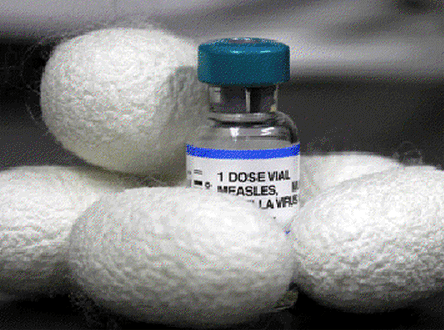
Soft to the touch, silk may also help preserve vaccines and drugs someday. (Fiorenzo Omenetto/Tufts University)
SNEED: Silk. It’s smooth, sleek, elegant. It makes expensive shirts and ties. And it can also save lives.
When pharmaceutical companies ship drugs around the globe, they have to refrigerate them, all the way from labs in Connecticut or New Jersey where they’re made, to remote villages in Madagascar or Zambia where they’re used. Refrigeration accounts for eighty percent of the cost of vaccines. But vaccines and antibiotics are often accidentally exposed to killer heat along the delivery route; as a result, nearly half of the world’s vaccines are lost every year.
But scientists at Tufts University recently discovered that silkworms create an alternative to refrigeration that’s more reliable. The silk they spin has many small water repellant pockets. These pockets trap vaccines and antibiotics like tiny pill bottles and hide them from the heat to keep the drugs biologically and chemically stable. Swathed in silk, drugs can withstand temperatures above one hundred and ten degrees Fahrenheit for months, possibly even years. Researchers also found a way to fashion a needle out of silk so that doctors can use the same silken device to both store and administer the drugs.
Silk may be a luxury when you wear it, but sending life-saving drugs around the world dressed in silk hardly seems extravagant. That’s this week’s note on emerging science, I’m Annie Sneed.
Related link:
TuftsNow: New Silk Technology Preserves Heat-Sensitive Drugs for Months without Refrigeration.
[SCIENCE NOTE THEME]
How Insects Influence Plant Evolution
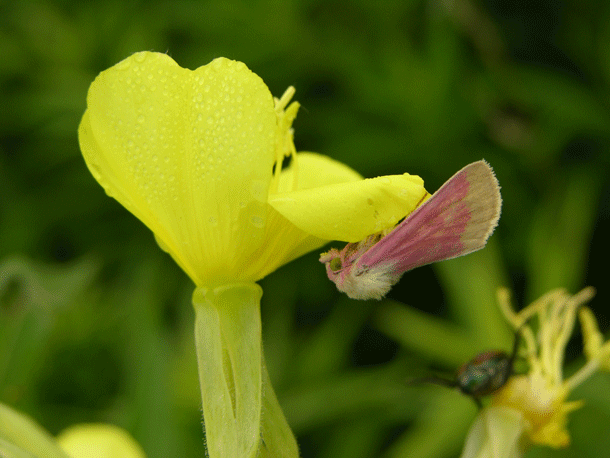
Schinia florida on an evening primrose flower with morning dew. (Photo: Anurag Agrawal)
CURWOOD: Well – for the silk we use, we depend on the mulberry tree that feeds the silkworm. And for millennia, insects - such as the silkworm – have in turn helped guide the evolution and defenses of plants.
A five-year study from researchers at Cornell University recently published in Science Magazine focuses on the critical role insects can play in plant evolution, and how speedy that evolution can be. The lead author is Anurag Agrawal, Professor of Ecology and Evolutionary Biology at Cornell.
AGRAWAL: Essentially plants are the only group of organisms on the planet that can generate their own energy. And something that we don’t often think about is the entire biosphere - all organisms in the food chain - are either directly or indirectly dependent upon plants.
We don’t think of lions as being dependent upon plants, or a particular bird species, but they eat organisms which eat other organisms which fundamentally must rely on plants - eat plants to get their energy. And, because of that, there’s been tremendous natural selection, tremendous pressure on plants over the eons to develop defenses.
CURWOOD: Talk to me about the way that plants have evolved alongside insects.
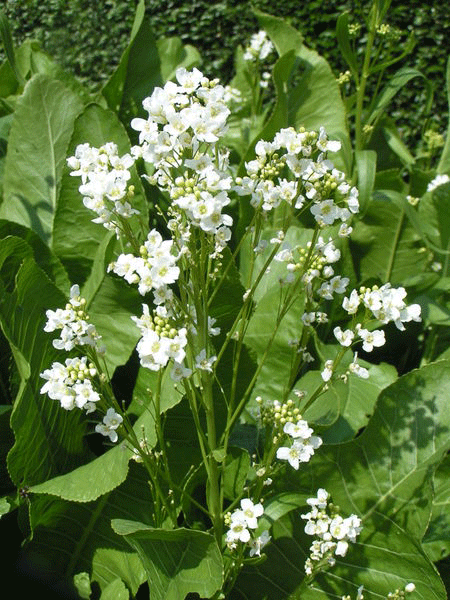
Horseradish plant (Wikimedia Creative Commons)
AGRAWAL: Yeah, there’s been a long history of circumstantial evidence that many of the traits plants have are adaptations to insect herbivores. If you think about the things we eat, what makes horseradish spicy? Horseradish is spicy because of a series of compounds called glucosinolates that we believe have evolved by natural selection to ward off insects. You know, the poisons that make milkweed so famous? - you know, same expectation. What’s nicotine? Nicotine is a neurotoxin of tobacco that has evolved by natural selection to ward off insects.
CURWOOD: Please describe the specifics of your study for us – what were you looking at?
AGRAWAL: Well, what we did is we set out experimental plots here at Ithaca, New York to examine the impact insect herbivores have on the plants, and removed insects from half of the plots using an insecticide treatment, and over a very quick period of time – about five years, five generations of the plants we were studying, the common Evening Primrose, it’s a wildflower – removal of insects resulted in the evolution of two very critical plant traits: How early the plants flower and the production of a toxin in the fruits of those flowers. When we removed insects, the plants were able to relax those defenses. They flowered earlier and they produced less of those toxins in their fruits.
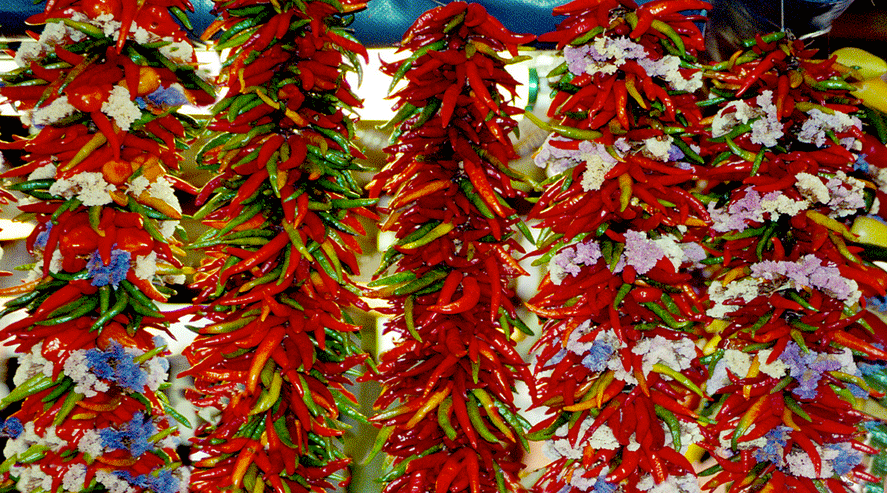
Hot peppers drying in a market. (Photo: Donna Sutton)
CURWOOD: So how surprised were you by these results?
AGRAWAL: The results that we got we had anticipated, and it was sort of part of our hypothesis, but what really surprised us was the rapidity of this evolutionary response. Seeing this response in five years was dramatic and it sort of – you know, it really knocked our socks off in the sense that, we know that evolution can be rapid, but to watch it happen, watch the genetic change happen over that period of time, was something that surprised us and the rest of the scientific community.
CURWOOD: I mean, one thinks of evolution, one thinks that it takes a long time for example, say to get from the great apes to humans - like millions of years, right?
AGRAWAL: Yeah, and that’s right. Evolutionary biology, in a sense is a historical science. We’re trying to piece together, often, how we got to where we are now, by looking into the past. And you’re certainly right that most speciation events – that is when one ancestor gives rise to two new entities that are isolated reproductively –often does take thousands to millions of years.
In our study, what we’re talking about is the rapid adaption that occurs within a species, and the way one might think about how this might be operative in nature is as the climate changes, as we have a set of good or bad years, if in a particular location there are high pest loads compared to another place where there are low pest loads, we can expect to see rapid change in those populations.
If those environmental effects are sustained over hundreds or thousands of years, we might then expect a new species to be born.
CURWOOD: So, seeing such rapid evolution in plants, what do you see as the larger significance of these findings?
AGRAWAL: I think there are a few things that are significant. One is the recognition that evolution occurs all around us. I think that’s an important message for the American public, in the sense that there’s surprising to me and many scientists still some debate about the importance of evolution in the history of the planet and the history of the organisms that we have on the planet. So, the fact that we can in real time, see that change in genes and genotype frequencies in that short period of time is a critical message to the public.
From a biological, and more academic perspective, one of the things we reported, one of the things that I think was known to Darwin, and that he sort of speculated on but still hasn’t cemented itself as dogma among scientists, and that is that – on the same time scale that ecological interactions occur, in our study for example, as the environment changed, - competition between species, plants that were in our plots, was intensified. On that same time scale, there were evolutionary changes that were occurring. And so I think one of the main messages to the academic community is: ecology or environmental change, and evolution, can occur on the same time scale and may in fact feed back with one another.
CURWOOD: I must ask what are the implications of your study and how we think about insecticides?
AGRAWAL: Well, it’s complicated, and I appreciate the question. Insecticides certainly have been a very valuable tool in the production of agricultural crops, and I think that what it tells us is that when we take insects out of the picture – using things like insecticides – we are encouraging plants throughout the evolutionary process to relax their defenses.
And, in fact, this is a story that I think is unfortunately really a big part of worldwide agriculture, and that is that we tend to select varieties of plants to grow that are diminished in their natural defensive capacities. If you take a wild plant that has survived out there for millions of years, it typically has a remarkable array of toxins and defense tactics to ward off pests.
About 10 percent of all plants produce hydrogen cyanide. We know hydrogen cyanide as a very general toxin – an anti-life compound – and it’s hydrogen cyanide that’s in 10 percent of the plants. It has no primary function, it doesn’t help the plant capture sunlight or produce seeds directly, what hydrogen cyanide does is it poisons insects that are trying to eat those plants.
One of the things that I think we do a little too well is we – either on purpose or inadvertently – we breed crops so that they have relaxed defenses and that increases our needs and our usage of pesticides, which I think we can all agree is problematic for the environment.
CURWOOD: Anurag Agrawal is Professor of Ecology and Evolutionary Biology at Cornell University. Thanks so much for taking the time today!
AGRAWAL: Thank you!
Related link:
Abstract of paper on insect-driven evolution in Science Magazine
[BIRDNOTE® THEME]
BirdNote: Pacific Wren
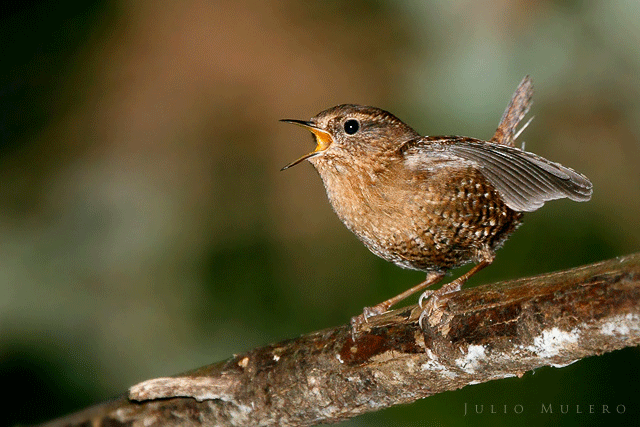
Pacific Wren in full song. (Photo: © Julio Mulero)
CURWOOD: Hearing the birds sing is one of the great pleasures of being out in the country - or even in your own garden, if you're lucky enough to have one. But as BirdNote®'s Mary McCann points out - even though we can listen and enjoy - human ears can miss a lot.
MCCANN: Listen carefully to the song of the Pacific Wren.
[SONG OF THE PACIFIC WREN]
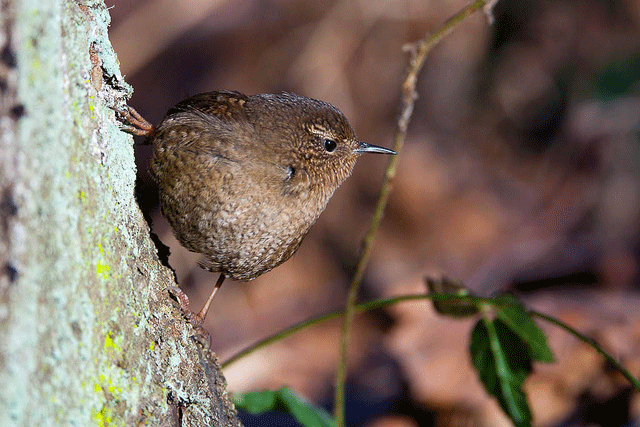
A Pacific Wren (Photo: © Tom Talbott)
MCCANN: What we hear as a blur of sound, the Pacific Wren hears as a precise sequence of sounds. That birds can hear so acutely the fine structure of song allows them to convey much information in a short sound. “This is probably why," naturalist Rosemary Jellis writes, "even the most extensive bird songs seem so brief to us. The bird, with its speeded-up time sense, must feel as if it had sung the equivalent of an operatic aria.” Let's listen again, but this time with the song slowed down to one-quarter speed.
[SONG OF THE PACIFIC WREN AT 1/4 SPEED]
MCCANN: Pacific Wrens may hear the song of other Pacific Wrens this way, enabling them to imitate each other. The same would be true for Winter Wrens of the eastern states and Eurasian Wrens. Whatever the species, they remind us that creatures we share the world with, read and respond to nature in ways we sometimes cannot see or hear.
[SONG OF THE PACIFIC WREN AT 1/4 SPEED AGAIN]
MCCANN: I’m Mary McCann.
CURWOOD: And you can check out the pictures of Pacific Wrens over at our website, loe dot org.
Related links:
- BirdNote
- Cornell Lab of Ornithology’s resource on the Pacific Wren (Troglodytes pacificus)
[MUSIC: Darren Barrett “Wren’s Theme #1” from Wrenaissance Volume 1 (Nagel-Heyer Records 2004).]
CURWOOD: Coming up, a manifesto for a new, more equitable and more sustainable future. Keep listening to Living on Earth!
[CUTAWAY MUSIC: Art Blakey: Little Hughie” from S’Make It (Verve Music Group 1964).]
ANNOUNCER: Funding for Living on Earth comes from the Grantham Foundation for the Protection of the Environment, supporting strategic communications and collaboration in solving the world’s most pressing environmental problems. The Gordon and Bette Moore Foundation. The Kendeda Fund, furthering the values that contribute to a healthy planet. And Gilman Ordway for coverage of conservation and environmental change. This is PRI Public Radio International.
CURWOOD: It's Living on Earth - I'm Steve Curwood.
[MUSIC FROM THE LION KING: CIRCLE OF LIFE]
Disney’s Commitment to the Circle of Life
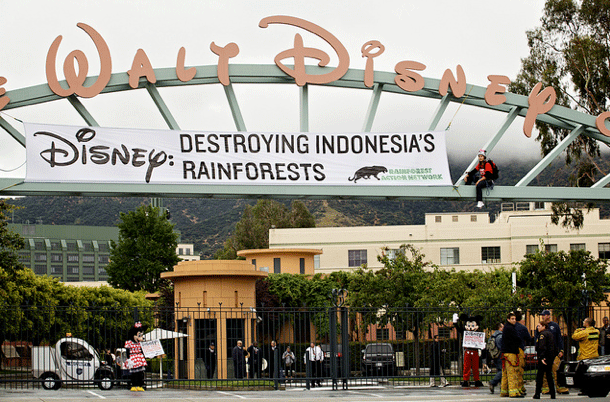
Activists with Rainforest Action Network (RAN), costumed as Mickey and Minnie Mouse, blocked the entrance to the Walt Disney Company's headquarters as two other activists unfurled a banner reading, “Disney: Destroying Indonesia’s Rainforests.” (Rainforest Action Network)
CURWOOD: In the Lion King, Disney celebrates the Circle of Life that moves us all. Well now the Disney Company itself is moving towards a new sustainability. After negotiations in the wake of protests from the Rainforest Action Network, Disney has announced it will reduce paper use, and make sure all it does use is responsibly sourced and harvested.
Disney, creator of many stories that inspire children’s love of nature, is the world’s largest publisher of children’s books. But a 2010 study found that nine of the ten top American publishers of children’s books – including Disney – used paper made from trees in Indonesia’s endangered rainforests. Robin Averbeck is the Forest Campaigner for the Rainforest Action Network. Welcome to Living on Earth!
AVERBECK: Hi there Steve!
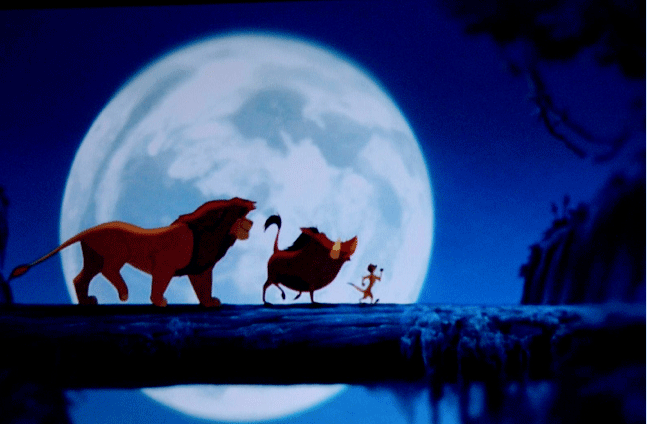
Disney’s The Lion King. (Photo: Robbie Gunn)
CURWOOD: So, last year, activists as I understand it, they dressed up as Mickey and Minnie Mouse and they locked themselves to the gates of Disney headquarters there in Los Angeles and hung a banner that read: “Disney Destroying Indonesia’s Forests.” Disney dismissed it as a publicity stunt, but why has Disney had a change of heart since the protests?
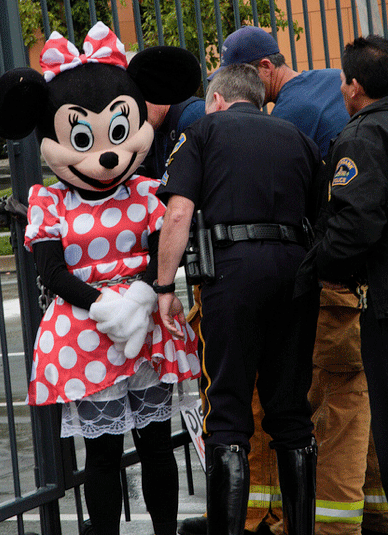
A Rainforest Action Network activist dressed as Minnie Mouse was arrested while protesting Disney rainforest destruction. (Rainforest Action Network)
AVERBECK: Disney, you know, really didn’t realize that they were getting paper from Indonesia. And the fact that they were producing books, kids books nonetheless, books about rainforests that contained Indonesian rainforests in them. And so it took a little bit of time for them to understand the issue, to understand how this was ending up in their books and really… Minnie and Mickey arriving on their doorstep to deliver this message in no uncertain terms was a huge wake-up call for them and for their executives.
CURWOOD: To what extent were you involved in the original protest?
AVERBECK: I was there, on-site, as a spokesperson, a supporter to the activists, so I was quite involved. I had the first-hand experience of seeing Minnie carted away in handcuffs, it was quite entertaining. But, just the visuals, the fact that Minnie was there to protest Indonesian rainforest destruction, herself, basically meant that the executives could not ignore this issue anymore.
CURWOOD: How big is Disney’s book business?
AVERBECK: Disney is the world’s largest children’s book and magazine publisher. So, that’s a lot of paper. And in addition to that, they are the largest owner of theme parks, the biggest licenser of toys, and so all of that is a lot of paper.
CURWOOD: So, what is the deal now? Disney is going to use all sustainable trees in all of its operations?
AVERBECK: Basically they’re saying: Where possible we’re going to source the sources that we know are really good, like recycled paper. Then, in other cases, they have set out a whole set of principles that say: These are absolutely the type of paper sources we don’t want to be involved in. We don’t want to be involved in paper where human rights are being violated, we don’t want to be involved in buying paper where natural forests are being converted to monoculture tree plantations. And so they basically set out a whole list of unwanted sources - is what they call them in the policy.
CURWOOD: Now, Disney is a large, large, large company. I think their sales are on the scale of 40 billion dollars a year, publishing kids books, but also they own ABC television. Does this policy mean that when they’re reading the scripts there on Good Morning America that it will be from recycled paper - it won’t be from rainforest?
AVERBECK: That’s absolutely true. This policy means that everything from the paper that’s in a theme park map in Tokyo to exactly the scripts in ABC studios in LA, to the packaging that’s used to wrap a princess doll in Russia. All of those things are going to be on paper that meets Disney’s new policy.
CURWOOD: At the end of the day, how much will Disney’s decision impact the rates of deforestation in places like Indonesia?
AVERBECK: Well, we hope a lot. Disney manufactures its products in, you know, 25,000 factories around the world. And that means that that message is going to be sent throughout a very, very wide supply chain and reach 25,000+ suppliers.
CURWOOD: To what effect is Disney’s new policy on paper going to affect endangered species in these regions?
AVERBECK: Well, in Indonesia specifically, this means that Disney is not going to be sourcing from any area that is, for example, habitat for Sumatran Tigers. Sumatran Tigers are directly threatened by the Indonesian pulp and paper industry. And, more widely than Indonesia, Disney’s paper policy means that they won’t be sourcing from high-value conservation areas, which is a lot of the critical habitat that’s left for these animals.
CURWOOD: Now that the Rainforest Action Network has proven that sustainable paper is not Mickey Mouse, what’s your next move?
AVERBECK: This policy itself is creating a lot of momentum. Basically, you know, if Disney can do something like this, a company as large as Disney, there’s no reason that other companies can’t do the same. Very specifically, in the publishing industry, you know, we’ve gotten nine of the top ten publishers to make a similar rainforest commitment, and the one remaining laggard is Harper Collins. So we certainly plan to profile HarperCollins inaction compared to its colleagues.
CURWOOD: What does HarperCollins say when you ask them to join their colleagues in the publishing profession?
AVERBECK: Well, HarperCollins has largely ignored us. We have been in conversation with them for multiple years at this point, and they have been unwilling to take public action.
CURWOOD: Robin, what Disney character did you grow up with?
AVERBECK: I grew up with a lot of Disney characters. I remember being particularly fond of the Lion King movie when it came out. So, Simba, Simba was close, near and dear to my heart.
CURWOOD: So, how does it feel now that you have protected Simba’s habitat?
AVERBECK: You know, I had a moment, when, early on in our engagement, about two months after we entered into negotiations Disney put out a statement to its suppliers urging them not to source from Indonesia. And one of their team members called me and said: “We’re sorry that this is taking us so long, it’s taken us three weeks to translate this into the number of languages it needs to be translated into to send out to all of our suppliers.”
And that for me was a moment of realization about just how enormous the impact of this, and the impact of Disney as a company, could be.
CURWOOD: And so now you believe Walt Disney: When you wish upon a star!
AVERBECK: (Laughs.) Uh, in the case of this paper purchasing policy, I certainly do!
CURWOOD: Robin Averbeck is a forest campaigner for the Rainforest Action Network, the organization that worked with Disney to develop its new paper policy. Thank you so much, Robin.
AVERBECK: Thank you so much Steve.
CURWOOD: We contacted HarperCollins. They didn’t comment about the Rainforest Action Network, but they did email this statement:
HarperCollins paper procurement policies support the general goals of environmentally sustainable fiber use, reducing pollution, and conserving natural resources through recycling and waste reduction. We use only acceptable fiber sources, and have worked with printers to eliminate the use of Indonesian fiber from books produced for HarperCollins.
Related links:
- The Rainforest Action Network’s press release on Disney’s new sustainable paper policy
- The Disney Company’s statement on sustainable paper
- HarperCollins Publisher’s statement on sustainable paper
[MUSIC: Dave Brubeck “When You Wish Upon A Star” from Dave Digs Disney (Columbia Legacy Records 1994).]
America the Possible
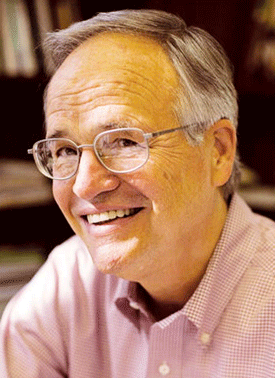
James Gustave Speth (Vermont Law School)
CURWOOD: James Gustave Speth chaired the White House Council on Environmental Quality for President Carter, helped found the Natural Resources Defense Council and the World Resources Institute, then ran the UN Development Program and the Yale School of Forestry and Environmental Studies.
You'd hardly think that he's a radical with a resume like that, but Gus Speth was arrested in front of the White House for protesting the XL pipeline in 2011. He's now a professor at the Vermont Law School, and writes that our politics are so corrupt and our environmental movement so weak that we are in peril. His new book is "America the Possible: Manifesto for a New Economy.”
SPETH: Do we want to merely revive the economy with all its failings or do we want to transform the economy into one where the real priorities of economic activities in our country are people and place and planet. And this old economy that everyone is struggling to revive was a pretty sad place, it still is a pretty sad place. During the period where economic growth went up 125 percent since 1980, we’ve had inequality mount, poverty mount, jobs fled our borders, we lost 42,000 manufacturing plants, the environment decline, life satisfaction flat-lined. I mean, that’s what happened in the old economy.
And, you know, it is now already higher GDP then it was before the Great Recession of 2008, and yet we still have all these problems. We need an economy that doesn’t simply prioritize growth, but more importantly puts a priority on sustaining people, sustaining place, sustaining planet.
CURWOOD: What’s wrong with GDP, why do you see it as such a threat to the environment and our society?
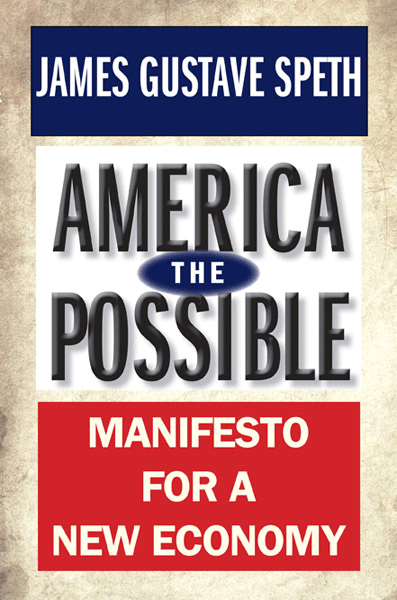
SPETH: Well, I have a chapter on that in “America the Possible” and, we need a new system of indicators that give us the right signals of whether we’re making national progress. Now Bobby Kennedy in 1968 made a powerful attack on GDP, pointing out that it is simply an aggregation of every economic transaction in a society, whether it’s good or bad or indifferent. And a lot of them are bad and you can ratchet up GDP by having an oil spill in the Gulf.
CURWOOD: Bobby Kennedy was running for president back then. His words on how we measure the economy still resonate today. Here they are:
[KENNEDY CLIP: Our Gross National Product now is over 800 billion dollars a year. But that Gross National Product, if we judge the United States of America by that, that Gross National Product counts air pollution and cigarette advertising and ambulances to clear our highways of carnage, it counts special locks for our doors and the jails for the people who break them, it counts in the destruction of the Redwoods and the loss of our natural wonder and chaotic sprawl. It counts napalm.
And it counts nuclear warheads and armored cars for the police to fight the riots in our cities. It counts with it rifles and fixed knives and the television programs which glorify violence in order to sell toys to our children. The Gross National Product does not allow the health of our children, the quality of their education, or the joy of their play, it does not include the beauty of our poetry, the strength of our marriages, the intelligence of our public debates, or the integrity of our public officials.
It measures neither our wit, nor our courage, neither our wisdom, nor our learning, neither our compassion nor our devotion to our country. It measures everything in short, except that which makes life worthwhile. And it can tell us everything about America except why we are proud that we are Americans.]
CURWOOD: Just months after he gave that speech, Bobby Kennedy was assassinated. And GDP is still the measure of America’s success. Again, Gus Speth.
SPETH: We need a really good measure of sustainable economic welfare that can go toe-to-toe with GDP every quarter. And there have been efforts to do that and what they show is that during the past few decades when GDP per capita went up and up and up, life satisfaction on average, a genuine progress indicator measure, flat-lined during that period.
CURWOOD: Lets talk about money. In your book, “America the Possible”, you’re quite critical of the way that money is created in this society by banks, detail to us what’s wrong with society in that process and how you would change it.
SPETH: Most money that’s in society is created by bank debt when people take out loans from banking institutions. So, it gives the banking institutions tremendous power, I mean, money is a system of power. And the banks determine who gets money, and overwhelmingly the process of investment in our society is chasing the highest financial return. That leads to many things that are highly destructive, such as investing in mountaintop removal, and tar sands and other things which the big banks are doing now. And it leads to severe underinvestment in social and environmental needs that don’t yield a high financial return.
CURWOOD: In a new America, how would we address social inequality?
SPETH: I think compared with Europe for example, we have a very weak unemployment insurance program. It reaches a very small portion of the unemployed and it compensates for a smaller percentage of wages, and we could certainly improve our unemployment insurance program, we could certainly improve the minimum wage program.
And through other means, including tilting the collective bargaining process and unionization process back towards organized labor, which we’ve tilted away from dramatically in recent decades, and of course the tax structure needs to be changed. In 1928, the top one percent of earners had about 24 percent of national income.
It went down by the mid 70s to about 7 percent of national income, but now, it’s gone all the way back up again to about 24 percent of the national income. So one goal that we ought to have for our society, in a way a minimum goal, is to return to the kind of income equality we had in the mid-70s. Not a terribly radical proposal, because we were there at one time, and it was a better place.
CURWOOD: And how does this affect the environment?
SPETH: The environment and the equity issues go together. People that are economically insecure find it really hard to address environmental issues when they have more pressing concerns with their pocket books. And when you try to do something like impose a charge, easily called a tax, on carbon emissions, and people see that that could raise gasoline prices and energy prices and they are already having trouble paying those bills, they become opponents of doing the right thing to save the planet’s climate. And so we need a more just economic system and I think that would provide the basis for more rigorous environmental protection.
CURWOOD: Now, in your career, you’ve worked closely with elected officials. President Jimmy Carter, you chaired the Council on Environmental Quality for him. Advised Bill Clinton. You’ve been close to electoral politics. In your view, what’s wrong with our democracy now, and how should we fix it?
SPETH: Well we certainly have what I call a creeping corporate-ocracy and plutocracy. You see the plutocracy, the money taking power in our politics everyday now. Corporations spend a lot more on lobbying then they do on campaigns - a lot more. We always have know that corporations were the principal economic actors in our system but I would say that they are now the principal political actors in our system and I think that there are things that we need to do.
We need to start by securing the voters. People automatically being registered to vote when the reach the age of 18, that’s common in advanced industrial countries. And we need to make voting easier, a longer time ahead of the election day to vote. Have a national holiday on Election Day. The other big thing we need to do is to enact a type of campaign finance reform that really works. And the latest proposal would be… if you make a small contribution, 250 dollars, to the president or someone running for Congress, the federal government would match that five to one. You know, if you had enough supporters, you could raise enough money to run a competitive campaign.
CURWOOD: So, your book, Gus Speth, America the Possible, a Manifesto for a New Economy, is a huge, broad vision that would change almost everything in America. The question is how do you get there from here? If the political system is broken, how do you make political change?
SPETH: Well, I want to make a prediction. Which is that when this election is over, there are going to be so many people fed up with what we have experienced in the process that there could well be a confluence of interests coming together to enact a set of pro-democracy political reforms.
I think we need an era to revive an era of protest, to revive an era of marches and demonstrations and non-violent civil disobedience. If it’s done in the right way, it can build support and it can dramatize the need for change. We saw that with the civil rights movement, and we need that kind of fervor again if we are going to build the America the Possible for our grandchildren.
[MUSIC: Brian Blade “Struggling With That” from Mama Rosa (Verve Music Group 2009).]
CURWOOD: Thank you, Gus, for coming in.
SPETH: Thank you, Steve.
CURWOOD: Vermont law professor Gus Speth. His book is "America the Possible: Manifesto for a New Economy."
Related links:
- James Speth
- America the Possible
[MUSIC CONTINUES]
CURWOOD: Living on Earth is produced by the World Media Foundation. Bobby Bascomb, Helen Palmer, Annie Sneed, James Curwood, Meghan Miner, Gabriela Romanow and Sammy Sousa all help to make our show, and so does our intern Emmett Fitzgerald. Jeff Turton is our technical director. Alison Lirish Dean composed our themes. You can find us anytime at L-O-E dot org - and check out our Facebook page - it’s PRI’s Living on Earth. I'm Steve Curwood. Thanks for listening!
ANNOUNCER: Funding for Living on Earth comes from Stonyfield Farm, makers of organic yogurt, smoothies, and more. Stonyfield invites you to just eat organic for a day. Details at just eat organic dot com. Support also comes from you, our listeners. The Go Forward Fund. And Pax World Mutual and Exchange Traded Funds. Integrating environmental, social, and governance factors into investment analysis and decision making. On the web at Pax World dot com. Pax World, for tomorrow.
ANNOUNCER 2: PRI Public Radio International.
Living on Earth wants to hear from you!
Living on Earth
62 Calef Highway, Suite 212
Lee, NH 03861
Telephone: 617-287-4121
E-mail: comments@loe.org
Newsletter [Click here]
Donate to Living on Earth!
Living on Earth is an independent media program and relies entirely on contributions from listeners and institutions supporting public service. Please donate now to preserve an independent environmental voice.
NewsletterLiving on Earth offers a weekly delivery of the show's rundown to your mailbox. Sign up for our newsletter today!
 Sailors For The Sea: Be the change you want to sea.
Sailors For The Sea: Be the change you want to sea.
 The Grantham Foundation for the Protection of the Environment: Committed to protecting and improving the health of the global environment.
The Grantham Foundation for the Protection of the Environment: Committed to protecting and improving the health of the global environment.
 Contribute to Living on Earth and receive, as our gift to you, an archival print of one of Mark Seth Lender's extraordinary wildlife photographs. Follow the link to see Mark's current collection of photographs.
Contribute to Living on Earth and receive, as our gift to you, an archival print of one of Mark Seth Lender's extraordinary wildlife photographs. Follow the link to see Mark's current collection of photographs.
 Buy a signed copy of Mark Seth Lender's book Smeagull the Seagull & support Living on Earth
Buy a signed copy of Mark Seth Lender's book Smeagull the Seagull & support Living on Earth

